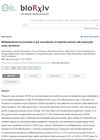Bifidobacterium Is Enriched in Gut Microbiome of Kashmiri Women with Polycystic Ovary Syndrome
February 2022
in “
Genes
”

TLDR Women with PCOS have more Bifidobacterium in their gut compared to those without PCOS.
A study conducted on 39 Kashmiri women, 19 with Polycystic Ovary Syndrome (PCOS) and 20 without, found that gut microbiome alterations are associated with PCOS. The gut microbiome was profiled using 16S rRNA sequencing, revealing that five genera, including Bifidobacterium, were significantly enriched in PCOS cases. The relative abundance of Bifidobacteriaceae was increased, while Peptococcaceae was decreased among cases. The study also found associations between increased relative abundance of Collinsella and Paraprevotella with higher fasting blood glucose levels, and Paraprevotella and Alkalibacterium with larger hip, waist circumference, and weight. Lower prolactin levels were associated with Peptococcaceae. A novel association was detected between Eubacterium and follicle-stimulating hormone levels and between Bifidobacterium and alkaline phosphatase, independently of the participants' BMI. This suggests a relationship between gut microbiome composition and PCOS with links to specific reproductive health metabolic and hormonal predictors in Indian women.











